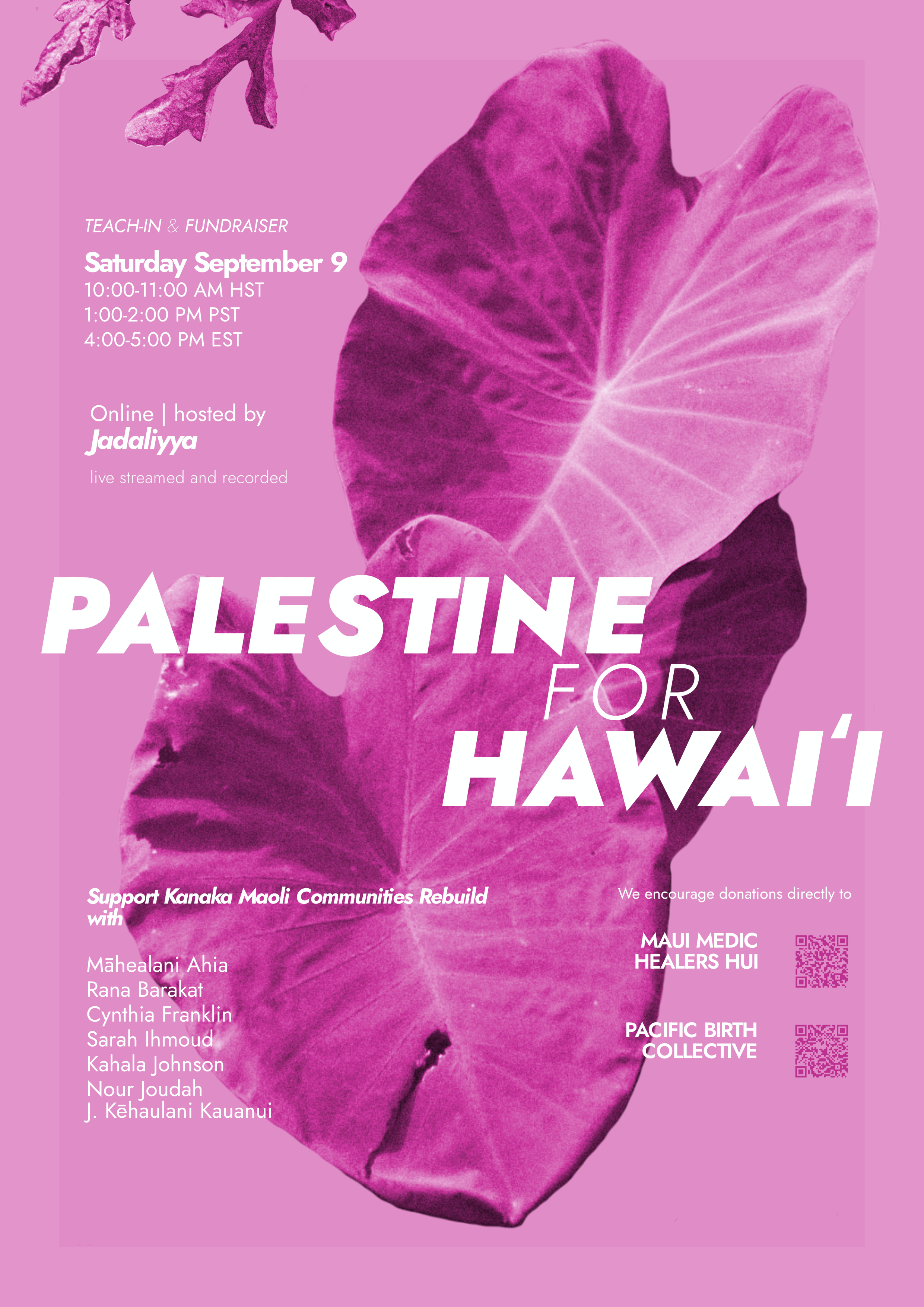Palestine for Hawai‘i - Teach-In and Fundraiser to Support Kanaka Maoli (Native Hawaiian) Communities Rebuild
Saturday September 9th, 2023
10-11 AM Hawaii / 1-2 PM PST/ 4-5 PM EST
Online, hosted by Jadaliyya (live-streamed and recorded)
Zoom Link:
https://us02web.zoom.us/j/89743029276
Meeting ID: 897 4302 9276
Watch the livestream on YouTube here.
Join Palestinian, Kanaka Maoli (Native Hawaiian), and allied scholars and movement workers for a teach-in and fundraiser to support Indigenous rebuilding efforts in Maui.
The recent wildfires in Maui have left historic Hawaiian communities devastated, with 99 confirmed dead, one thousand missing people and thousands more displaced from their homes and lands. As Kanaka Maoli have taught us, these wildfires are not “natural,” but are settler colonial disasters with roots in the expropriation of Native lands, waters, and other natural resources – in the service of the tourist industry and backed by the U.S. military-industrial complex.
This teach-in centers the histories and experiences of Kanaka Maoli communities with U.S. settler colonialism in Hawai’i, continued organizing for Hawaiian sovereignty, and practices of solidarity between Hawai’i and Palestine. It is grounded in the recognition as Palestinians that Native Hawaiian’s ongoing struggles for freedom from U.S. military occupation and settler colonialism are interconnected with our own continued struggle for liberation from Israeli colonial violence.
In the immediate wake of city, county and state government abandonment, and with private realtors now preying on those who have lost their homes, we call on Palestinians across the diaspora (and our allies) to support Native Hawaiians’ local efforts to rebuild their communities and livelihoods as an act of radical love and reciprocal solidarity.
We encourage community donations directly to Mauna Medic Healers Hui and Pacific Birth Collective.
Speakers
Cynthia Franklin is Professor of English at the University of Hawai‘i. She coedits the journal Biography. She is the author of Narrating Humanity: Life Writing and Movement Politics from Palestine to Mauna Kea (2023), Academic Lives: Memoir, Cultural Theory, and the University Today (2009) and Writing Women’s Communities: The Politics and Poetics of Multi-Genre Anthologies (1994). Coedited special journal issues include, for Biography, “Life in Occupied Palestine” (2014). She has served for 10 years on the Organizing Collective of the US Campaign for the Academic and Cultural Boycott of Israel (USACBI), and cofounded Students and Faculty for Justice in Palestine at UH (SFJP@UH) and Jewish Voice for Peace-Hawai'i.
J. Kēhaulani Kauanui is Professor of American Studies and affiliate faculty in Anthropology at Wesleyan University, where she teaches courses related to critical Indigenous studies, critical race studies, settler colonial studies and anarchist studies. She is the author of Hawaiian Blood: Colonialism and the Politics of Sovereignty and Indigeneity (Duke University Press 2008); Paradoxes of Hawaiian Sovereignty: Land, Sex, and the Colonial Politics of State Nationalism (Duke University Press 2018); and Speaking of Indigenous Politics: Conversations with Activists, Scholars, and Tribal Leaders (University of Minnesota Press 2018). She serves on the advisory board for the U.S. Campaign for the Academic and Cultural Boycott of Israel.
Māhealani Ahia (she/her/'o ia) is a Los-Angeles born Kanaka Maoli scholar, activist, songcatcher, and storykeeper with lineal ties to Lāhainā, Maui. Māhea is a PhD candidate in English (Hawaiian Literature) and in Women, Gender, and Sexuality Studies at University of Hawaiʻi at Mānoa. Her dissertation entitled, “Shapeshifting Hawaiian Biography: the Life and Afterlives of Kihawahine,” theorizes feminist power and leadership within the moʻo (reptilian water deity) clan connected to Lāhainā. Māhea is an organizer for Students and Faculty for Justice in Palestine at UH and co-organizer of the Mauna Kea Syllabus Project.
Kahala Johnson (he/they/ʻo ia) is an Indigenous politics, futures, and gender and sexuality studies scholar at the University of Hawaiʻi at Mānoa. Their research focuses on genderqueer and poly decolonial love, and their dissertation, “A Night Slippery with Echoes,” examines decolonized futures of the Hawaiian Kingdom. They are co-founder of the Hale Māhū (LGBTQ space) at Puʻuhuluhulu University at Mauna Kea, where they welcomed Palestinian allies. Born and raised in Nā Wai ʻEhā, Maui, Kahala has been working with family to reoccupy ancestral lands, and has helped build multiple puʻuhonua (refuge) across Maui.
Nour Joudah is an Assistant Professor in the Department of Asian American Studies at UCLA and a former President’s and Andrew W. Mellon Postdoctoral Fellow in Geography at UC-Berkeley (2022-23). Dr. Joudah completed her PhD in Geography at UCLA (2022), and wrote her dissertation Mapping Decolonized Futures: Indigenous Visions for Hawaii and Palestine on the efforts by Palestinian and native Hawaiian communities to imagine and work toward liberated futures while centering indigenous duration as a non-linear temporality. Her work examines mapping practices and indigenous survival and futures in settler states, highlighting how indigenous countermapping is a both cartographic and decolonial praxis. She also has an MA in Arab Studies from Georgetown University, and wrote her MA thesis on the role and perception of exile politics within the Palestinian liberation struggle, in particular among politically active Palestinian youth living in the United States and occupied Palestine.
Rana Barakat is Asociate Professor of history and Director of the Museum at Birzeit University in Palestine. Her research interests include the history and historiography of colonialism, nationalism, and cultures of resistance. She has published in several venues including the Journal of Palestine Studies, Jerusalem Quarterly, Settler Colonial Studies, and Native American and Indigenous Studies. She has a book forthcoming with UNC Press titled Lifta and Resisting the Museumification of Palestine: Indigenous History of the Nakba, which advances an Indigenous understanding of time, space, and memory in Palestine by focusing on the details of the people and place of Lifta village over time. And her second book is in progress, The Buraq Revolt: Constructing a History of Resistance in Palestine, argues that this 1929 revolt was the first sign in the mandate period of sustained mass resistance to the settler-colonial project, including direct and rhetorical actions against both political Zionism and British imperialism, planting seeds of a century of mass political mobilization.
